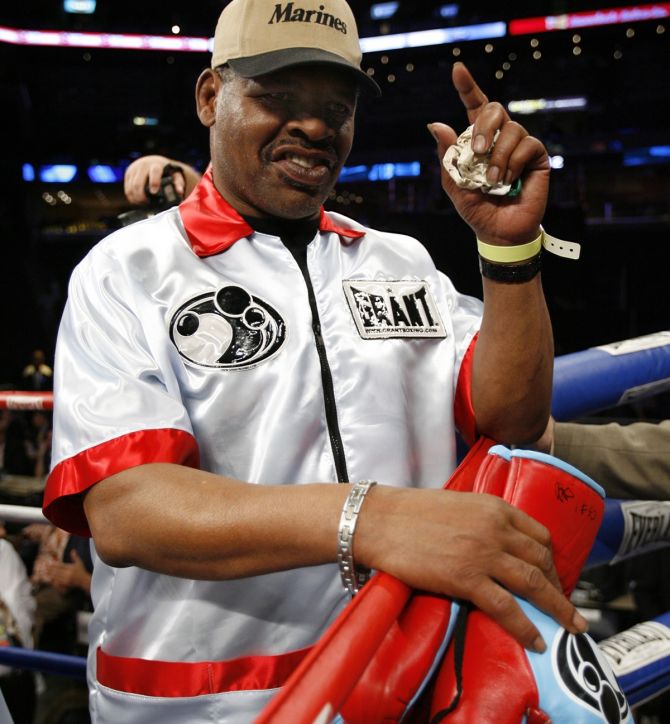
Leon Spinks, the gap-toothed fighter from the St. Louis slums who pulled off one of the most stunning upsets in boxing history in 1978 by defeating Muhammad Ali to take the undisputed world heavyweight title, has died at the age of 67 after a long battle with cancer, a spokesman said on Saturday.
Spinks passed away with only a few close friends and family present due to COVID-19 restrictions.
"Leon fought his battle with numerous illnesses resiliently, never losing his trademark smile," The Firm PR said in a statement sent to Reuters. "Showing true Spinks determination, he never threw in the towel."
Spinks rose to fame winning the light-heavyweight gold medal for the United States at the 1976 Montreal Olympics. He shocked the boxing world just two years later when he defeated Ali in a split decision. It was only his eighth professional.
That would be the highlight of Spinks' career as Ali would get his revenge in the rematch seven months later in New Orleans.
Spinks would fight for a heavyweight crown only on one other occasion, losing to Larry Holmes in 1981.
On Saturday, Holmes wrote on Twitter: "You gave me a hell of a fight but you were a good guy. You lived your life the way you wanted and it was a good one. I pray you Rest In Peace."
Spinks retired in 1995 at the age of 42 with a pedestrian 26-17-3 record, including 14 knockouts. Much of his post-boxing life was marked by substance abuse, subsistence jobs and obscurity.
But in the late 1970s he had plenty of reasons to flash his trademark broad smile, sometimes accentuated by two missing front teeth.
After serving in the Marine Corps, Spinks won a gold medal in the light heavyweight competition at the 1976 Montreal Olympics. He was undefeated in his first seven professional fights but few thought he had any chance at all against the legendary Ali, even though the champ was past his prime going into their Feb. 15, 1978, fight in Las Vegas.
Spinks' aggressive style and superior stamina allowed him to outduel Ali in a 15-round split decision, becoming the first boxer to take the title from Ali in the ring.
Spinks' reign did not last long. Seven months later, he squared off again with Ali at the Superdome in New Orleans and a properly prepared Ali won a 15-round unanimous decision. Spinks already had been stripped of his WBC heavyweight title for refusing to fight No. 1 contender Ken Norton in favor of the Ali rematch.
After the second Ali fight, Spinks was never again a serious championship contender, although in 1981 he took on Larry Holmes for the WBC crown. Holmes beat him on a technical knockout in the third round.
Spinks continued fighting, often for embarrassingly small purses, until retiring following a unanimous decision loss to Fred House on Dec. 4, 1995.
When his brother Michael Spinks upset Holmes for the IBF heavyweight championship in 1985, he and Leon became the first brothers to have held world heavyweight championships.
The Spinks brothers were often bullied growing up in a notoriously rough housing project in St. Louis and learned to fight as a matter of self-preservation. In a way, Leon remained a raw, naive child of the rough streets and after he won the title, the life of "Neon Leon" became a cautionary tale.
"It might have looked to people like I was having a good time," Spinks told the Chicago Tribune, "but deep down I wasn't because I wasn't who I wanted to be. I never had anything when I was young. We were poor and now I had so much, so I tried to enjoy it. Having money like that makes you feel you can do anything you want but you can't."
Spinks was unsophisticated and did not seem to mind being photographed without his false teeth - replacements for the ones he lost to a head-butt in the Marines, he said. He endured a series of arrests for driving violations and problems with drinking and drugs, including an arrest for cocaine and marijuana possession.
In 1981 he was mugged outside a bar in Detroit and later woke up naked in a hotel, missing several thousand dollars worth of clothes, jewelry and cash, as well as his false teeth.
The millions of dollars he won in the ring were lost to exorbitant spending and mismanagement, Spinks said.
In the late 1990s media reports said he sometimes stayed in a homeless shelter in the St. Louis area and was taking random minimum-wage jobs. In 2005 Spinks was living in Columbus, Nebraska, working as a janitor at a YMCA and at a McDonald's.
In his 50s he began showing signs that the punches he took to the head had brought on a form of dementia.
In October 2011 Spinks married Brenda Glur, who began managing his personal appearances, and moved to Nevada, where he had two emergency abdominal operations in 2014.













 © 2025
© 2025